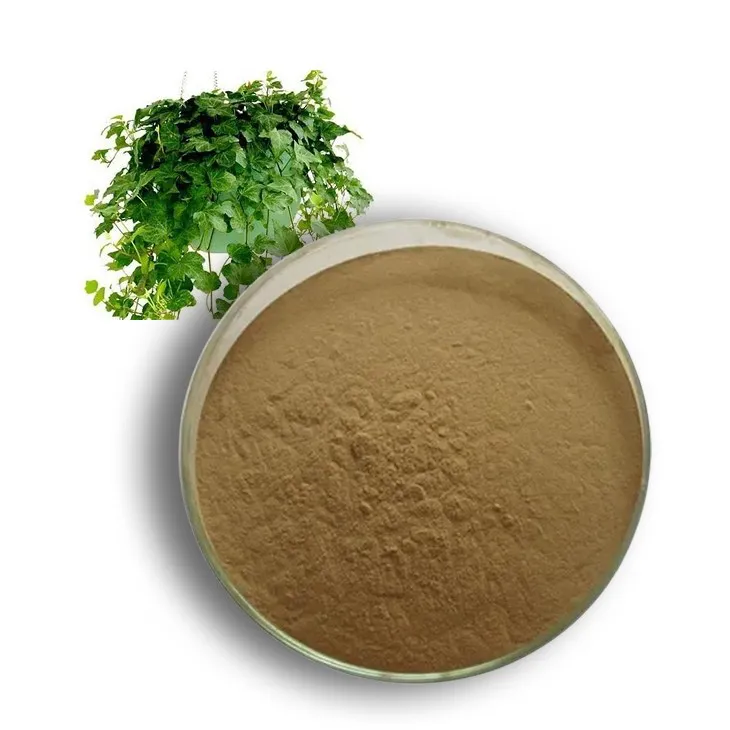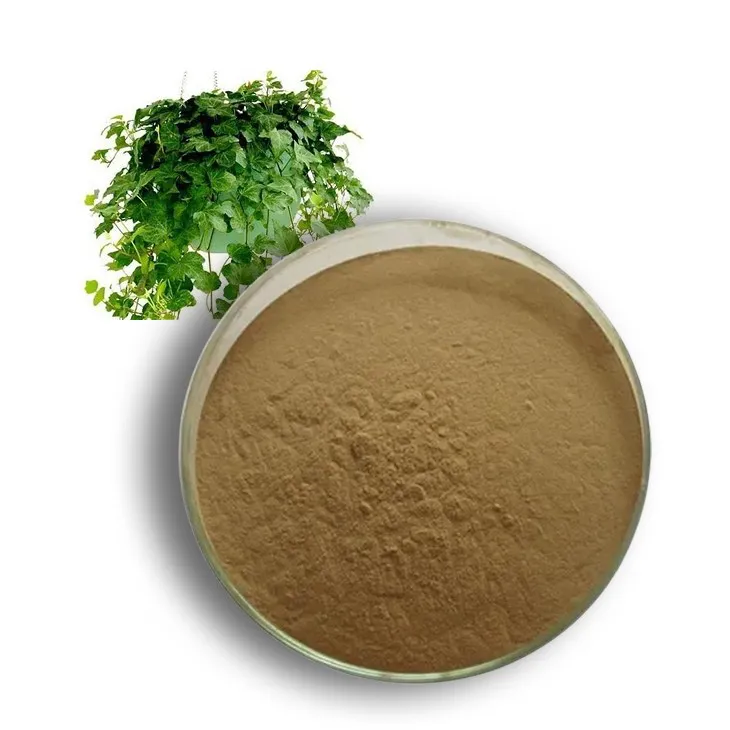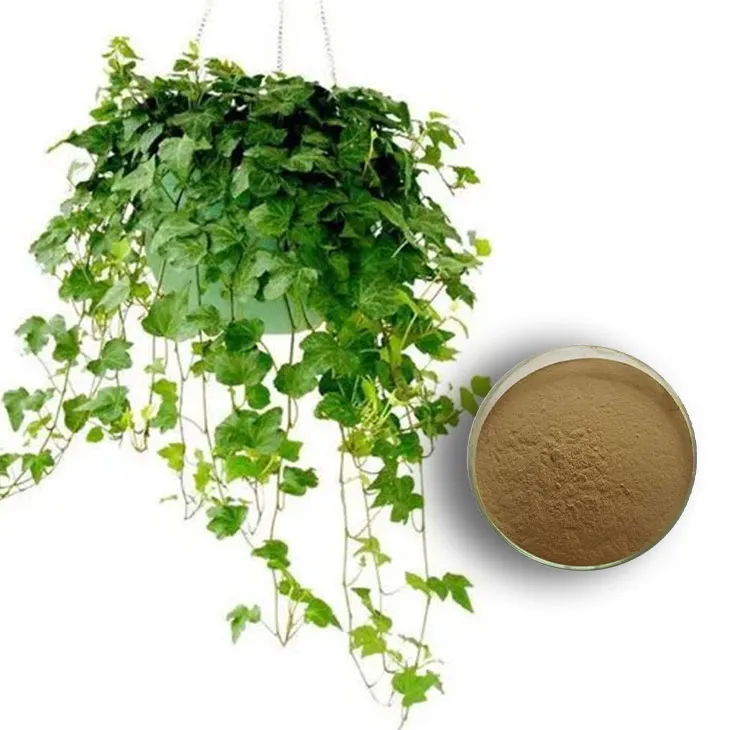- 0086-571-85302990
- sales@greenskybio.com
Organic Non GMO Ivy Extract
2024-11-28

Introduction
Organic non - transgenic Ivy Extract has emerged as a remarkable natural ingredient with diverse applications. Ivy, a well - known plant, has been used in traditional medicine for centuries. When it comes to the organic non - transgenic form of its extract, it offers a pure and natural alternative. This extract is rich in bioactive compounds, which contribute to its wide range of potential uses in various industries.
Bioactive Compounds in Ivy Extract
The organic non - transgenic Ivy Extract is rich in various bioactive compounds. One of the significant compounds is saponins. Saponins are known for their potential anti - inflammatory properties. These properties are of great interest as they can play a crucial role in different applications.

Applications in Skincare
Soothing Irritated Skin
In the skincare industry, the anti - inflammatory nature of Ivy extract can be highly beneficial. It may help soothe irritated skin. Irritated skin can be caused by various factors such as environmental pollutants, harsh chemicals in skincare products, or even certain skin conditions. The extract's anti - inflammatory properties can act on the skin cells and reduce the irritation, providing a calming effect.
Reducing Redness
Another important aspect in skincare is reducing redness. Redness in the skin can be a sign of inflammation, whether it is due to acne, rosacea, or other skin disorders. The Ivy extract, with its anti - inflammatory components, can help in minimizing this redness. It works by targeting the underlying inflammation that causes the skin to appear red. For example, when applied topically, it can interact with the skin's blood vessels and reduce the dilation that often leads to redness.

Role in Herbal Medicine
Respiratory Health
In the field of herbal medicine, the Ivy extract is being explored for its possible role in respiratory health. Some studies suggest that it might assist in relieving coughs and congestion. Coughs can be caused by a variety of reasons, including viral or bacterial infections, allergies, or environmental irritants. The Ivy extract could help to loosen mucus, which is often a key factor in coughs and congestion. By loosening the mucus, it becomes easier for the body to expel it, thus providing relief to the respiratory system. This potential benefit makes it an interesting ingredient for further research in herbal medicine for respiratory ailments.

Contribution to Cosmetics - Hair Health
Strengthening Hair Follicles
In the cosmetics realm, the Ivy extract can contribute to hair health. It may strengthen hair follicles. Hair follicles are the structures in the skin that produce hair. Weak hair follicles can lead to hair loss, thinning hair, or brittle hair. The extract's bioactive compounds can potentially nourish the hair follicles, making them stronger. This can result in healthier hair growth and reduced hair fall.
Promoting Shiny, Healthy - looking Hair
Additionally, the Ivy extract can promote shiny, healthy - looking hair. Shiny hair is often associated with healthy hair as it indicates that the hair cuticles are smooth and well - nourished. The extract can provide the necessary nutrients to the hair shaft, making it look more lustrous. It can also improve the overall texture of the hair, making it softer and more manageable.
Production and Quality Control of Organic Non - transgenic Ivy Extract
Organic Cultivation
The production of organic non - transgenic Ivy extract starts with the organic cultivation of the ivy plant. Organic cultivation involves avoiding the use of synthetic pesticides, fertilizers, and genetically modified organisms (GMOs). This ensures that the ivy plant grows in a natural and sustainable environment. Organic farming practices also focus on soil health, water conservation, and biodiversity. By maintaining these standards, the quality of the ivy plant used for extraction is enhanced, and it is free from harmful chemicals and genetic modifications.
Extraction Process
Once the ivy plants are harvested, the extraction process begins. There are different methods of extraction, such as solvent extraction or steam distillation. Solvent extraction involves using a suitable solvent to dissolve the bioactive compounds from the plant material. Steam distillation, on the other hand, uses steam to extract the volatile compounds from the ivy. The choice of extraction method depends on the desired compounds and the end - use of the extract. Careful selection and control of the extraction process are crucial to ensure the purity and potency of the Ivy extract.
Quality Control
Quality control is an essential part of the production of organic non - transgenic Ivy extract. This involves testing the extract for various parameters. For example, it is tested for the presence of contaminants such as heavy metals, pesticides (even though it is organically cultivated, cross - contamination can occur), and microbial contamination. The concentration of the bioactive compounds, such as saponins, is also measured to ensure consistency in the product. Quality control also includes verifying the non - transgenic nature of the extract through appropriate genetic testing methods.
Market and Consumer Trends for Organic Non - transgenic Ivy Extract
Increasing Demand for Natural Ingredients
In today's market, there is an increasing demand for natural ingredients in various products. Consumers are becoming more conscious about what they put on their skin and in their bodies. They are looking for products that are free from synthetic chemicals and GMOs. Organic non - transgenic Ivy extract fits well into this trend as it is a natural ingredient with multiple potential benefits. This increasing demand is driving the growth of the market for Ivy extract - based products.
Preference for Organic and Non - transgenic Products
There is also a clear preference for organic and non - transgenic products among consumers. They believe that organic products are safer and more environmentally friendly. Non - transgenic products are preferred as they are considered to be more "natural" in a sense. This preference is influencing the development and marketing of products containing organic non - transgenic Ivy extract. Manufacturers are highlighting the organic and non - transgenic aspects of the extract to attract consumers.
Research and Future Prospects
Ongoing Research
There is ongoing research on organic non - transgenic Ivy extract. Scientists are continuously exploring its potential benefits in different areas. For example, more in - depth studies are being conducted on its anti - inflammatory properties and how they can be optimized for various applications. Research is also focused on uncovering new bioactive compounds in the extract that may have additional health or cosmetic benefits.
Potential New Applications
Based on the current research, there are potential new applications for the Ivy extract. In the medical field, it may have potential in treating other inflammatory diseases apart from respiratory issues. In the cosmetics industry, it could be used in new product formulations for anti - aging or scalp health. These potential new applications open up new opportunities for the development of products containing Ivy extract.
Challenges and Opportunities
However, there are also challenges in the research and development of Ivy extract - based products. One of the challenges is the standardization of the extract. Since the composition of the extract can vary depending on factors such as the plant source and extraction method, it is difficult to have a standardized product. This can pose problems in terms of product consistency and regulatory compliance. On the other hand, this also presents an opportunity for further research to develop more standardized extraction methods. Another challenge is the lack of large - scale clinical trials. Most of the studies on Ivy extract so far have been pre - clinical or small - scale human studies. Conducting large - scale clinical trials will be necessary to fully validate its potential benefits and gain wider acceptance in the medical and cosmetics industries.
FAQ:
What are the main bioactive compounds in organic non - transgenic Ivy extract?
The main bioactive compounds in organic non - transgenic Ivy extract include saponins. These saponins are known for their potential anti - inflammatory properties.
How can organic non - transgenic Ivy extract benefit skin?
Organic non - transgenic Ivy extract can benefit skin due to its anti - inflammatory nature. It may help soothe irritated skin and reduce redness.
What potential role does it play in respiratory health?
In the field of respiratory health, some studies suggest that organic non - transgenic Ivy extract might assist in relieving coughs and congestion as it could help to loosen mucus.
How does it contribute to hair health?
It may contribute to hair health by strengthening hair follicles and promoting shiny, healthy - looking hair.
Why is the organic non - transgenic form of Ivy extract special?
The organic non - transgenic form of Ivy extract offers a pure and natural alternative. It is free from genetic modification and is thus considered more natural and potentially safer for various applications.
Related literature
The Bioactivity of Ivy Extract: A Comprehensive Review"
"Organic Ivy Extract in Skincare: New Insights"
"Ivy Extract and Respiratory Health: Current Research"
- ▶ Hesperidin
- ▶ citrus bioflavonoids
- ▶ plant extract
- ▶ lycopene
- ▶ Diosmin
- ▶ Grape seed extract
- ▶ Sea buckthorn Juice Powder
- ▶ Beetroot powder
- ▶ Hops Extract
- ▶ Artichoke Extract
- ▶ Reishi mushroom extract
- ▶ Astaxanthin
- ▶ Green Tea Extract
- ▶ Curcumin Extract
- ▶ Horse Chestnut Extract
- ▶ Other Problems
- ▶ Boswellia Serrata Extract
- ▶ Resveratrol Extract
- ▶ Marigold Extract
- ▶ Grape Leaf Extract
- ▶ blog3
- ▶ blog4
-
The Maca Extract Brands Most Worth Buying.
2024-11-28
-
The best cactus extract on the market.
2024-11-28
-
High - quality lily extract products.
2024-11-28
-
Organic Clove Powder Factory.
2024-11-28
-
Oat Straw Extract Powder
2024-11-28
-
Genistein
2024-11-28
-
Propolis Extract Powder
2024-11-28
-
Red Wine Extract
2024-11-28
-
Kupilu Extract
2024-11-28
-
Lemon Extract
2024-11-28
-
Cranberry Extract
2024-11-28
-
Bilberry Extract
2024-11-28
-
Yellow Pine Extract
2024-11-28
-
Thunder God Vine Extract
2024-11-28





















